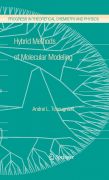
Hybrid Methods of Molecular Modeling is a self-contained advanced review offering step by step derivation of the consistent theoretical picture of hybrid modeling methods and the thorough analysis of the concepts and current practical methods of hybrid modeling based on this theory. Hybrid Methods of MolecularModeling presents its material in a sequential way paying attention both to the physical soundness of the approximations used and to the mathematical rigornecessary for practical developing of the robust modeling code. Historical remarks are given when it is necessary to put the current presentation in a moregeneral context and to establish relation with other areas of computational chemistry. The reader should have experience with basic concepts of computational chemistry and/or molecular modeling. Basic knowledge of operators, wave functions, electron densities is necessary. Presents a rigourous treatment of the derivations of hybrid methods of molecular modeling Explains the concepts and current methodologies of hybrid methods Explicitly describes the approximations assumed in the modeling code Applies theoretical hybrid methods to problems of importance to chemists, biochemists, and materials researchers INDICE: Molecular modeling: Motivation and general setting.- Molecular potential energy.- Basics of quantum mechanical technique.- Alternative representations.- Basics of quantum chemistry.- Alternative tools.- Separating electronic variables.- Hybrid perspective: Ab initio methods.- Pseudopotential methodsand valence approximation.- Hartree-Fock-Roothaan based semiempirics.- Non-Hartree-Fock semiempirics.- Molecular mechanics.- Hybrid methods for complex systems.- Deductive molecular mechanics: Motivation.- Electronic structure in SLGapproximation.- DMM family.- What is DMM?.- Intersubsystem frontier.- Conclusion.- Coordination compounds: Characteristic of coordination compounds (CCs).-Hybrid and classical models of CCs.- Qualitative picture of bonding in metal complexes.- Hybrid model for CCs.- Mechanistic model for stereochemistry of CCs.- Hybrid models of spin-active compounds.- Conclusion.
- ISBN: 978-1-4020-8188-0
- Editorial: Springer
- Encuadernacion: Cartoné
- Páginas: 425
- Fecha Publicación: 01/06/2008
- Nº Volúmenes: 1
- Idioma: Inglés
